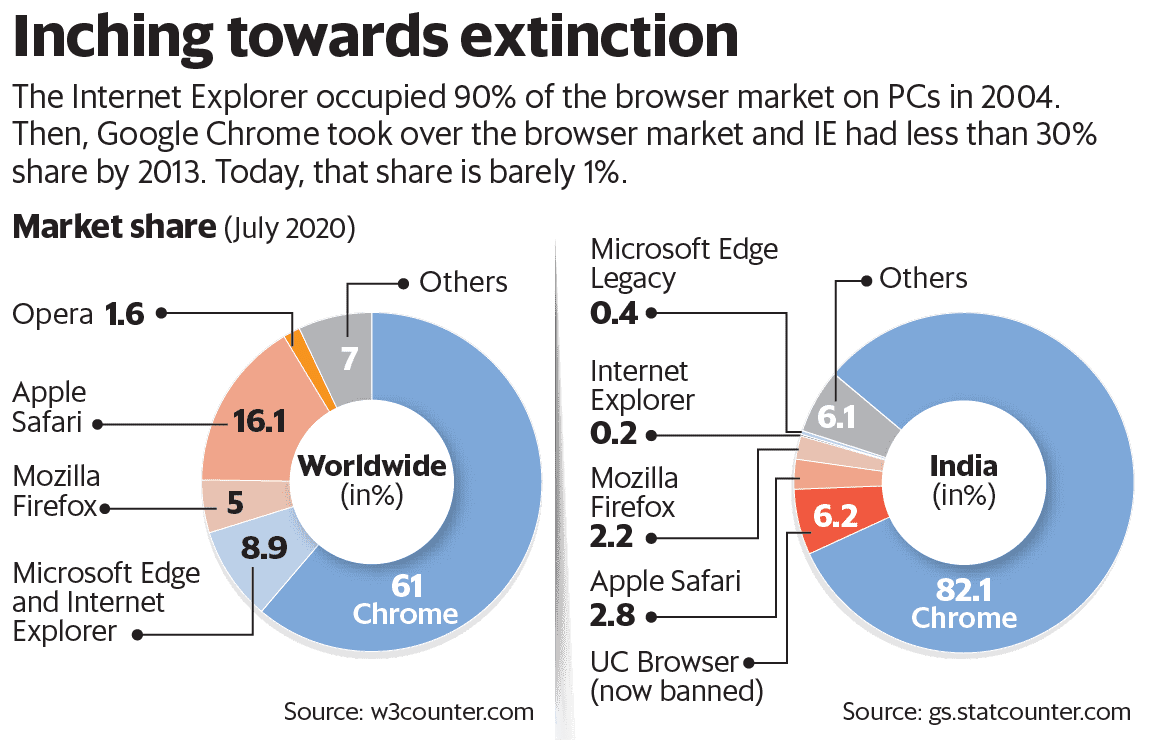Microsoft Internet Explorer is the 25-year-old web browser which is once a dominant gateway to the web glories. It is known for being slow and clunky and many people only use it once to download the other web browsers of their choice. Microsoft has officially announced ‘Microsoft Edge‘ as the next-generation browser for Windows 10 which will now replace Internet Explorer. MS Edge comes with 5 innovative features – Integration with Cortana, Annotation Tools, Distraction-free Reading Mode, Sharing via Integrated Share Panel, and Analyze Your Site’s Performance. According to a report by NetMarketShare, Microsoft Edge is the second most popular Internet browser in the world.
Microsoft teams’ web apps will be supporting the Internet Explorer11 till 30 November 2020 and it will completely shut down the browser online by 17 August 2021. The users will not be able to connect with Microsoft 365 apps and services on Internet Explorer after the above-mentioned dates.
How did Internet Explorer gain popularity?
The story of Internet Explorer (IE) covers the first real antitrust battle faced by BigTech. Antitrust is referred to as competition laws developed by the US government to ensure that fair competition exists in an open-market economy. In 1995, when Internet Explorer was launched, the company licensed the code used to make Netscape Navigator, the then-dominant browser. At that time, Netscape had a $49 price tag on it. This is the main reason why all web browsers today are available for free. It led the US Department of Justice to launch an antitrust investigation into Microsoft and the judge eventually asked for the company to be broken up and said that giving Internet Explorer for free was, in fact, anti-competitive behaviour.
The reason behind Internet Explorer lose dominance on the World Wide Web :
 By 2004, In spite of the antitrust battle, Internet Explorer occupied 90% of the browser market. Gradually, Firefox becomes popular among users. Meanwhile, in 2008, Google launched Chrome and in the next five years Google took over the browser market, seriously effecting the users of Internet Explorer. By 2003, Internet Explorer was once widely used web browser with 95% usage share but in 2013 it comes to 30% and in present, it has only 1% of share in the market.
By 2004, In spite of the antitrust battle, Internet Explorer occupied 90% of the browser market. Gradually, Firefox becomes popular among users. Meanwhile, in 2008, Google launched Chrome and in the next five years Google took over the browser market, seriously effecting the users of Internet Explorer. By 2003, Internet Explorer was once widely used web browser with 95% usage share but in 2013 it comes to 30% and in present, it has only 1% of share in the market.
For many who used Internet Explorer since when it launched, it’s like saying goodbye to an old friend.
[zombify_post]








